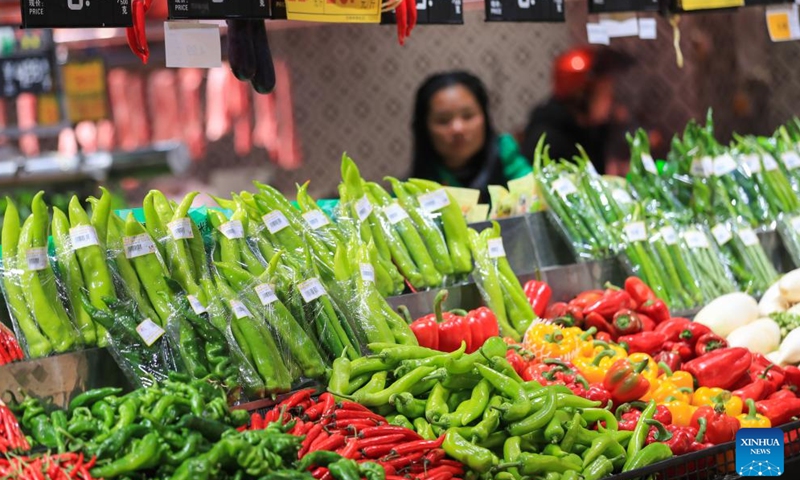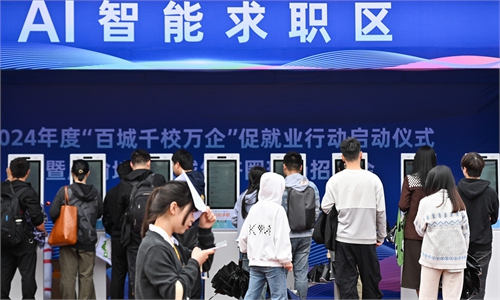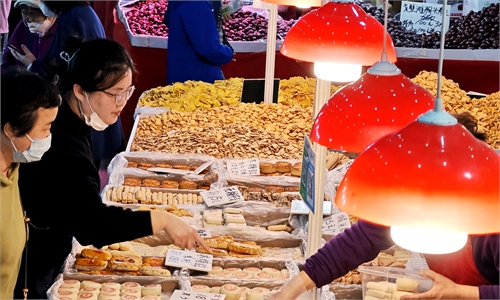
A customer shops at a supermarket in Congjiang County, southwest China's Guizhou Province, March 9, 2024.File Photo: Xinhua
China's consumer price index (CPI), the main gauge of inflation, will likely maintain a moderate rebounding trend in the coming months, the National Bureau of Statistics said on Monday.
In May, CPI rose by 0.3 percent year-on-year, meaning that China's overall inflation has been flat. Analysts said that the reading came as the country's consumer spending has been steady.
From the current trajectory of price changes for food, manufactured goods, and services, the CPI will continue to experience a moderate rise, Liu Aihua, a spokesperson for the NBS, said on Monday during a press conference in Beijing.
"With a large number of seasonal fruit and vegetables entering the market, food prices will remain at a seasonal low. From the perspective of industrial consumer goods, the overall supply is sufficient, which is conducive to the stability of prices. For the service sector, with the further recovery of service demand, service prices are expected to continue to improve," Liu said.
According to statistics released by the NBS on Wednesday, food prices, which edged down 2 percent year-on-year, were the main factors weighing down CPI in May. Prices of eggs, fruits and edible oil all dropped due to sufficient market supply.
Food prices affected the year-on-year decline of CPI by about 0.37 percentage points, Liu said. The price of eggs decreased by 8.5 percent year-on-year, the prices of fresh fruits decreased by 6.7 percent, while edible oil prices fell 5.1 percent.
However, pork prices rose by 4.6 percent year-on-year in May, with freshwater fish prices rising 3.3 percent. Still, general food prices declined by 2 percent And, energy prices increased by 3.4 percent, with services prices up 0.8 percent.
The NBS spokesperson noted that the core CPI will rise modestly.
Core CPI refers to the change in prices of goods and services, excluding food and energy prices, which are typically more volatile. According to NBS statistics, core CPI in May rose 0.6 percent year-on-year, maintaining a moderate rise.
The producer price index (PPI), the gauge of manufacturing sector inflation, fell by 1.4 percent in May, according to the NBS.
The decrease in May reading narrowed by 1.1 percentage points from April, affected by the upward price of some international commodities and the improvement of supply and demand in the domestic industrial products market, Liu said.
"The month-on-month growth became positive for the first time in seven months. The May reading is the first month-on-month increase since October 2023," said Liu.
Liu predicted that the year-on-year decline in PPI would continue to narrow during the coming months. "Although there are still uncertainties in international commodity prices, the gradual implementation of domestic large-scale equipment updates and consumer goods trade-in programs will support prices in some industries."
At the same time, as China is entering a hot summer season which will drive huge electricity demand, the use of coal will increase, and coal prices will continue to rise, said Liu.
Analysts said that an improvement in China's manufacturing industry helped ameliorate the PPI reading.
China has rolled out a series of programs to boost consumption, such as stimulating auto purchases, promoting trade-ins of consumer goods and large-scale upgrading of industrial equipment.
Analysts say the trade-in program will boost consumption and open up a huge market worth trillions of yuan this year. They expect retail sales to grow by more than 5 percent through 2024, helping the economy weather rising headwinds
Global Times


